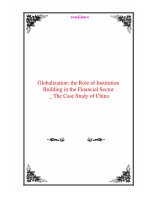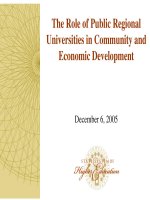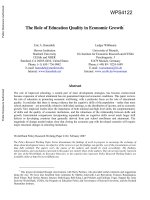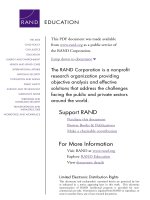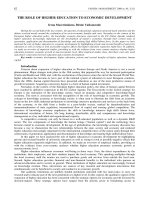The role of a writer: Reflections of a novelist
Bạn đang xem bản rút gọn của tài liệu. Xem và tải ngay bản đầy đủ của tài liệu tại đây (317.98 KB, 6 trang )
TRIBHUVAN UNIVERSITY JOURNAL, VOL.: 31, NO.: 1 & 2, JUNE/DEC. 2017
153
THE ROLE OF A WRITER: REFLECTIONS OF
A NOVELIST
Prabhu Ray Yadav*
ABSTRACT
Chinua Achebe is an iconic name in Africa as well as world
literature. He is a writer committed to the social uplift of marginalized and
downtrodden people. He believes that serious writer should have a sense
of responsibility to enhance the quality of humanity by way of exposing
all manmade suppression and oppression in society. Achebe is a crusader
against colonialism that enslaved the African countries and their people.
He is opposed to the injustice and atrocities perpetrated by colonial rulers,
and he wants to awaken the African people to rise up against the onslaught
of colonialism in future. The present work serves as an inspiring guide to
the African people and writers to pursue the spirit of struggle to gain self
dignity and recognition. He writes with a missionary zeal and exhorts the
writers to use their art as a weapon to assert their confidence and past
glory. For him, art is a means to bring about change in society. His works
have served as a teacher for his readers. So, Achebe has become a novelist
cum teacher, especially for African people, and in general for his readers
all over the world.
Key words: Art, culture, role, writer, pen, instrument, eradicate, poverty,
literacy, social political, refinement, imbibe, nullify, vengeance, onslaught.
INTRODUCTION AND OBJECTIVE
Chinua Achebe, one of the most distinguished Nigerian writers,
was born on 16th November 1930, in Ogidi. He had held several offices
as a Controller, Director, Researcher and Visiting Professor. He was a
teacher at the University of Nsukka, Nigeria. Achebe is one of the most
highly regarded of African writers in English. His greatest strength as a
novelist is the steady refinement of his control over language. His stories
deal with the social and political problems facing his country, including the
difficulty of the post colonial legacy. Achebe's (1965). "The Novelist as
Teacher" is a talk delivered at the first Common Wealth Writers' Conference
at Leeds in 1964. Art and Culture of the society should always entertain
as well as instruct. According to him, the writer is an organic part of the
society. Therefore, he requests the fellow African writers to advise the
future generation through their art of writing. Each and every writer should
have the social responsibility in order to eradicate poverty and illiteracy.
*
Mr. Yadav is Lecturer in English, Patan Multiple Campus, Patan Dhoka, TU.
154 THE ROLE OF A WRITER: REFLECTIONS OF A NOVELIST
Achebe maintains that each and every society in the world has its own
needs and beliefs. He pinpoints modern European song writer as a "divine
administrator of vengeance" for writing a pop song entitled I Ain't Gonna
Wash for a Week. The African society builds a separate identity as against
the Western identity.
Achebe (1969), a self conscious writer and committed artist, has
stated: "most of my readers are young. They are either in school or college
or have only recently left. And many of them look up to me as a kind of
teacher" (p. 42). He believes that modern African writers should teach
rather than impress the readers. He states in his essay "Novelist as Teacher"
"… I would be quite satisfied if my novels (especially the ones I set in the
past) did no more than teach my readers that their past . . . on God's behalf
delivered them" (p. 72). A writer has more responsibility to shape the social
and moral values of the society. The nature and art must be pure. Achebe
(2010) argues that art is important, but so is education. The two must go
hand in hand. He has noted in his essay 'The Novelist as Teacher' that
African people lost their self – respect in the colonial period, and it is this
dignity that they must now regain. So, he specially stated that the role of a
writer in modern Nigeria is to write about the contemporary issue of why
the rights have been denied for African people in their own home land.
Beauty of art and education
In "The Novelist as Teacher", Achebe himself is a sort of missionary
who uses his pen as an instrument to educate the people. He takes this great
task to enlighten the readers and he also succeeded. But it is only fitting that
the novelist be considered one of the most important types of teacher today.
Achebe (1982) stresses in his essay that the duty of a writer is to teach and
educate the society. He tries to depict the history of pre-colonial Ibo culture
to the present day youths. He believes in art. Art must be pure and can bring
about change in the society. Pen is the only powerful weapon that should
always tell the truth without hesitation and misrepresenting. Achebe (2013)
feels that his current society should get rectified from the post-colonial
sentiment through his novels. His first novel Things Fall Apart shows the
culture and colonial power in his community.
This article aims to highlight the role of the African writers in
search of equality in comparison with the Western writers. African writers
encounter with the rich and intellectual writers of the Western culture
exposing their pride and prejudice. Achebe's writing encourages African
writers to acknowledge their own culture and society. Such thoughts of
Achebe enrich his readers with new vigour and strength. This paper focuses
on the following objectives:
TRIBHUVAN UNIVERSITY JOURNAL, VOL.: 31, NO.: 1 & 2, JUNE/DEC. 2017
155
• To think about the upright and moral duty of the writer(s) for the sake
of people and society,
• To make readers aware of the real events and situations as essential
components of true art and knowledge,
• To develop a sense of alertness about the beauty of culture and
society,
• To empower the readers to grasp the importance of culture and its
beauty for the education of society.
METHODOLOGY
The methodological approach in this paper is based upon Edward
E. Said's conception which insists on a comprehensive dismantling of
colonial hierarchies and structures. It requires an enlightened intellectual
consensus which expresses itself in favour of the larger, more generous
human realities of community among cultures, peoples, and society, (p.
162). In other words, the intellectual stirrings of anti colonialism as reflected
in Achebe's (1997) writing can only be properly realized when nationalism
becomes more "critical of itself – when it proves itself capable of directing
attention to the abused rights of all oppressed classes" (p. 264).
The passionate lover for community
A writer should achieve something from his work either in
directing the society to the right path or enlightenment. N. P. White says:
"Knowledge is truth, Truth is knowledge"(p. 146). Achebe also wishes that
his country people should get proper knowledge of the universe. The Ibo
community people are ready to believe anything that comes to them. He says
that whatever he writes it is related to the people of his own community.
Likewise, it is done in all the countries by the best writers. He also wants
to display to the readers that Africans are not brutal as myths portrayed in
the colonial period. Another misconception that Achebe sets out is to rectify
the language spoken by the Ibo tribe. He calls his fellow African writers to
dedicate themselves to their society. Achebe works hard not only to broaden
the world of art and literature, but to lead his community people to the
modern world. When he visited Mysore, in India once, the Dalit activist
took him to the Dalit colonies. He was very disturbed at the sight of the
condition in which the Dalit lived and said that in Africa it was considered
sin if the blood of God's children was spilled on the ground but here the
blood of Dalits was considered as virtuous to spill on the mother earth.
Most of his novels linger in the minds of readers especially of college going
students. It shows his passionate love of his community and tradition of his
country.
156 THE ROLE OF A WRITER: REFLECTIONS OF A NOVELIST
Achebe's orientation in Africa has been recognized that art is in the
public domain, a sense of social commitment is mandatory upon the artist.
He is not only showing just matters but also re-orients the society. He advised
that the writers must rise to teach and by doing so can help the society to
regain belief in itself and put away complexes of the years of denigration
and self-abasement. The novel or any writings must be effective. It should
not affect the people instead people should know the effect of it. Writers'
work must instruct or re-direct the perceptions of people about a particular
thing. Art is always pure so that the readers prefer to read it from any angle
he or she chooses. After reading he or she gets pleasure, while for others it
is a lesson. Sometimes beauty is seen, some will appreciate it. Achebe is the
best story teller; all types of readers can enjoy his novels. Achebe (2013) in
Things Fall Apart he used ornamental words as given below:
The drums beat and the flutes sang and the spectator held their
breath. Analyze was a willy craftsman, but Okonkwo was as
slippery as a fish in water. Every nerve and every muscle stood out
on their arms, on their thighs, and one almost heard them stretching
to breaking point. In the end Okonkwo threw the cat. (p. 3)
This plot is expressed with too much of background explanations.
So, he portrays every scene to the readers as a reality show. When he
describes the year, he says: "That year the harvest was sad, like a funeral,
and many farmers wept as they dry up the miserable and rotting yams. One
man tied his cloth to a tree branch and hanged himself" (p. 17). This shows
the natural reaction of the character Okonkwo.
Lagos' word 'Like'
Atta's (2005) novel published in twentieth century is "Everything
Good Will Come". She sets her novels for Non-Nigerians, to teach Nigerian
sociology. Atta breaks up the narrative to explain to her audience how the
word, 'like' is used in Lagos: 'In Lagos we used the word 'like' this way.
You liked to stare, you liked to criticize, you liked to make appointments
and not keep them. There was an assumption, bad English aside, that if
you did something often, you liked it' (p. 151). Her foreign audience will
benefit this sense how the Africans are imperfect user of English. She has
beautifully written about the patriarchal society.
Achebe explains about the caste based prejudice prevailing in
Nigeria in his the story Marriage is a Private Affair:
The prejudice against Nnaemeka's marriage was not confined to his
little village. In Logos, especially among his people who worked
there, it showed itself in a different way. Their women, when they
TRIBHUVAN UNIVERSITY JOURNAL, VOL.: 31, NO.: 1 & 2, JUNE/DEC. 2017
157
met at their village meeting, were not hostile to Nene. Rather, they
paid her such excessive difference as to make her feel she was not
one of them. But as time went on, Nene gradually broke through
some of this prejudice and even began to make friends among them.
Slowly and grudgingly, they began to admit that she kept her home
much better than most of them. (p. 181)
In Arrow of God, the third novel of Achebe (1969) talks about
political and cultural activities around the villages. The disaster of Igbo
society is portrayed in such a way that it will lead not only to the assimilation
of western values and beliefs but also the loss of the Igbo cultural identity.
Carroll celebrates 'Achebe's Flexible use of English to demonstrate Igbo
modes of speech and thought' (Carroll 1970). His inordinate love of that
word itself should be of interest to psychoanalysts. Sometimes his fixation
on blackness is equally interesting because Achebe wants to eradicate racism
in western society. He reveals that writers alone can change the society by
using effective method of writing in an honest way. He wants that the writer
must always be passionate over his works.
'The Novelist as Teacher' reveals that the artists must have been
given full freedom in writing through their conscience. Achebe's writings
influence the readers. He wants the readers, especially in a country like
Nigeria to understand how the British and the European people are
considered superior to them. They must be made aware through reading
some great African writers. He thinks the writers should not imagine as the
counterparts of the Europeans and behave like them (Killam, 1973).
The writers must have close relationship with the readers. Most of
the readers of Achebe are youngsters. These youngsters treat him as their
teacher and good guide. Moreover, they believe that his novels help to solve
the social problems. The students should regard his novels not just as novel
but should treat them as holy books. They give high honour and would not
treat them as mere entertainer. Therefore, the writer can be free to express
his individual ideas. In such a way, Achebe realizes his part very clearly.
'Negritude' is a new coinage describing the African Black's feelings and
attitudes. He argues that art is powerful, useful, and valuable to this unique
world. We, the world writers, must take knowledge and expose it to the
people in the world.
CONCLUSION
Chinua Achebe, in his essay The Novelist as Teacher, requests
African writers not to deviate from ethics and their moral responsibility as
teachers in their lives and works. This essay has two different meanings.
158 THE ROLE OF A WRITER: REFLECTIONS OF A NOVELIST
Achebe, on the other hand, approaches the literature of postcolonial and
western writers. On the other, he wants to acquaint himself with his audience
as a teacher of society and culture. The Western writers highlight their culture
and reiterate their common concerns. Achebe views social inferiority as the
major product of the orientation to Western literature. Achebe's writings
probe into repressed minds. The post colonial writers are urged to convey
Achebe's message affirmatively in their works and writings. Achebe shows
how Western writers propagate their culture in the world literature for the
promotion of their own cultural knowledge and values. The African writers,
on the other hand, are immune to the charge of propagating their culture.
The Western writers serve as leaders to promote the cultural knowledge
of propagating their own people. Achebe presents the Western writers as
being respectful to their literature rather than the world literature. Achebe
further argues that the Western culture and literature seek to nullify others'
literature.
While African beliefs are strong, post colonialism has imposed
inferiority complex upon the culture of the people. Achebe wants to build
confidence in his country and people so that they become proud of their
culture. Expressions like anti- racist racism are Achebe's strategy to uplift
the African people and their culture. With African writers imbibing the
positive power of ethnocentrism, the people gain the confidence to infuse
their old mind set with that of the new world.
WORKS CITED
Achebe, C. (1965). English and the African writer. London: Heinemann
Books.
--- (1977). An image of Africa. United States: Massachusetts University
Press.
--- (1969). Arrow of God. New York: Anchor Books.
--- (2010). Flax-golden tales: Marriage is a private affair. Kathmandu:
Ekta Books.
--- (1982). Morning yet on creation day: Essay. London: Heinemann
Books.
--- (2013). Things fall apart. UK: Penguin Books.
Atta, S. (2005). Everything good will come. United States: Interlink Book.
Carroll, D. (1970). Chinua Achebe: Novelist, poet, critic. New York:
Twayne Press.
Killam, G. D. (1973). The role of the writer in a new nation: African writers
on African writing. London: Northwestern University press.
